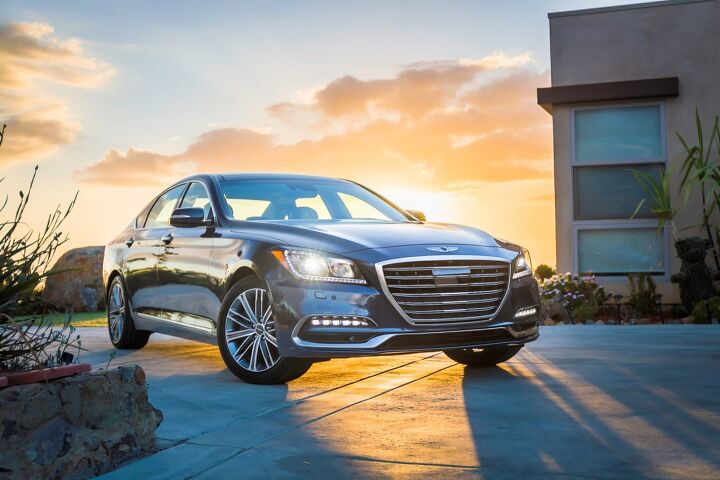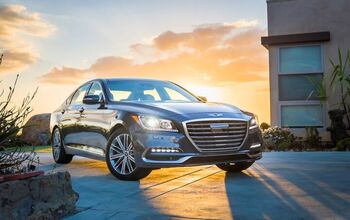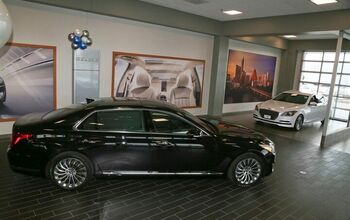Genesis of a Dealer Dispute With Hyundai Motor America

You would think you’d be happy when a peer succeeds and goes on to greater things, but the reality is often a little grimier and less magnanimous. Genesis has been a sore subject around Hyundai Motor Company ever since the automaker spun it off into its own brand. However, this has less to do with its role as an elite nameplate and more about how to manage it as part of the greater whole.
Earlier this month, dealers expressed their dismay by walking out of a meeting with Hyundai Motor America’s executives — which included CEO Kenny Lee and COO Brian Smith. The incident didn’t last particularly long and the conference eventually got back on track, but it proves there’s unresolved issues as to how the Genesis brand should be handled.
According to Automotive News, dealers were upset at a proposal made by Hyundai that would see Genesis’ luxury vehicles sold at non-Hyundai retailers. Sources claimed they also weren’t particularly pleased with the amount the company planned to compensate stores that would no longer be eligible to host the upmarket brand.
Dealers exited the meeting suddenly to talk amongst themselves. Currently, stores have to undergo an approvals process to sell certain Genesis products. But Hyundai wants to create standalone retailers over the next few years to increase overall volume for the brand. It now appears concerned that the existing dealer network won’t be sufficient — especially if Genesis is going to maintain a prestigious image.
“One of the best things about this closed process is the candid approach taken by the dealers and company personnel allowing us to speak openly and freely and reach mutually agreed upon decisions,” Hyundai of America said in a statement to Automotive News. “At this particular meeting, during a conversation on the Genesis brand, the dealers asked to have further discussions on the topic, which already are taking place.”
At present, around 352 Hyundai stores are eligible to sell the Genesis G90. Ideally, Hyundai would limit the luxury sedan to a smaller number of exceptionally nice retailers with Genesis-specific showrooms in regions where the vehicle is most likely to sell. The company announced its goals in August but hasn’t yet come up with a plan that appeases its existing retail network. It hopes to have something everyone can agree on by April.
“The company’s intent has always been that Genesis vehicles will be sold exclusively through a distinct Genesis dealer body that is profitable for dealers and will deliver the luxury experience Genesis buyers expect,” Hyundai said. “Both the company and the dealers are in complete agreement that this is critical for the success of the Genesis brand and the dealer body.”
[Image: Hyundai]

A staunch consumer advocate tracking industry trends and regulation. Before joining TTAC, Matt spent a decade working for marketing and research firms based in NYC. Clients included several of the world’s largest automakers, global tire brands, and aftermarket part suppliers. Dissatisfied with the corporate world and resentful of having to wear suits everyday, he pivoted to writing about cars. Since then, that man has become an ardent supporter of the right-to-repair movement, been interviewed on the auto industry by national radio broadcasts, driven more rental cars than anyone ever should, participated in amateur rallying events, and received the requisite minimum training as sanctioned by the SCCA. Handy with a wrench, Matt grew up surrounded by Detroit auto workers and managed to get a pizza delivery job before he was legally eligible. He later found himself driving box trucks through Manhattan, guaranteeing future sympathy for actual truckers. He continues to conduct research pertaining to the automotive sector as an independent contractor and has since moved back to his native Michigan, closer to where the cars are born. A contrarian, Matt claims to prefer understeer — stating that front and all-wheel drive vehicles cater best to his driving style.
More by Matt Posky
Latest Car Reviews
Read moreLatest Product Reviews
Read moreRecent Comments
- ToolGuy Michelin's price increases mean that my relationship with them as a customer is not sustainable. 🙁
- Kwik_Shift_Pro4X I wonder if Fiat would pull off old world Italian charm full of well intentioned stereotypes.
- Chelsea I actually used to work for this guy
- SaulTigh Saw my first Cybertruck last weekend. Looked like a kit car...not an even panel to be seen.
- GregLocock Bear in mind this is purely a branding exercise and has no significant input from AM. Buying one of these is like buying a Pink Floyd T shirt, no Dave and Nick didn't personally sew it up for you.


































Comments
Join the conversation
A few year old off-lease low mileage Genesis is a screaming bargain. That said, Genesis can never compete with the real luxury makes unless it has dedicated high-end dealerships. But the question is: Will Genesis ever do the kind of volume and attract the kind of big spending customer that Lexus, MBZ and BMW do? Personally I doubt it. Look how much trouble Acura, Cadillac and Lincoln are having trying to compete.
Most of you are on point. I recently decided to move up (relative term) from a ‘15 Genesis to the new ~$72k G90. Despite the new Genesis dealer within a dealer concept... this time the buying experience was much worse than when the Genesis was Hyundai. The process took almost a month due to internal haggling on the lease terms between the dealer and Hyundai/Genesis. I had to physically go into the dealership everytime they needed to change a number. The whole thing was a complete cluster. With Genesis, don’t listen to any of the grandiose hype about a “luxury brand or a luxury experience” from company executives or the (paid) automotive press. Just go in and negotiate as if you are trying to get a deal on a $15k Hyundai Accent... because that’s how it is going to go down. If you are willing to put up with a little bs, you can get a comfortable and reliable product at a very good price. Luxury is nonexistent because you get what you pay for...